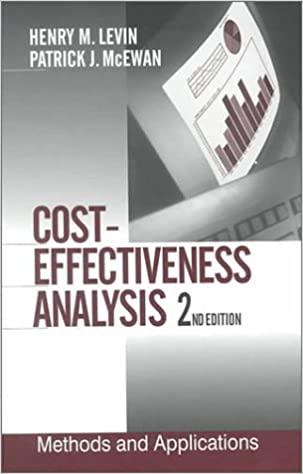


Q11) As a manager, you must decide (on the basis of annualized costs) which type of machine and how many to buy given two alternative technologies: A and B. Technology related information: Machine costs are as follows: Machine type Annualized acquisition cost ($) A 90,000 B 110,000 Demand Information: Product forecasts and processing times on each type are as follows: Product Annual demand (units) Unit processing times (min) A B 1 55,000 2.5 4 2 70,000 3 3.5 Operations related information: The products need to be produced in batches due to positive setup times. The relevant information is given below. Product Batchsize (units) Setup times (min) A B 1 5,000 90 105 2 2,000 60 75 The firm plans to have one shift per day. The shift works for 8 hours per day for 290 days in a year. In addition to the information given above, suppose all of the following also hold: (0) The management desires to employ a capacity cushion of 11%. (ii) Every operating hour incurs a cost of $10 on machine type A and $13 on machine type B. (iii) Each machine of either type requires one worker as an operator. The wage of worker is $11 per hour on a machine of (iv) (v (v) type A and it is $12 per hour on a machine of type B. The firm computes the operators' labor cost on the basis of actual operational time, The firm charges an overhead calculated at 125% of direct labor costs. For all products, type A has 6-sigma quality. Type B has a process capability ratio Cp of 1.4 for product 1 and a Cp of 1.50 for product 2. Each unit of Product 1 produced at the design tolerance limits incurs a cost of $5; this cost is $4 for Product 2. The unacceptable units can be reworked at these costs to become acceptable again. The firm computes its quality cost on the basis of unacceptable units only. Just out of curiosity, the firm also wants to compute the Poor Qulaity Loss using the Taguchi Loss Function for both processes. But they will not use thisin their capacity selection decision. What is the corresponding poor quality cost for each process (machine type) choice? (vi) Q11) As a manager, you must decide (on the basis of annualized costs) which type of machine and how many to buy given two alternative technologies: A and B. Technology related information: Machine costs are as follows: Machine type Annualized acquisition cost ($) A 90,000 B 110,000 Demand Information: Product forecasts and processing times on each type are as follows: Product Annual demand (units) Unit processing times (min) A B 1 55,000 2.5 4 2 70,000 3 3.5 Operations related information: The products need to be produced in batches due to positive setup times. The relevant information is given below. Product Batchsize (units) Setup times (min) A B 1 5,000 90 105 2 2,000 60 75 The firm plans to have one shift per day. The shift works for 8 hours per day for 290 days in a year. In addition to the information given above, suppose all of the following also hold: (0) The management desires to employ a capacity cushion of 11%. (ii) Every operating hour incurs a cost of $10 on machine type A and $13 on machine type B. (iii) Each machine of either type requires one worker as an operator. The wage of worker is $11 per hour on a machine of (iv) (v (v) type A and it is $12 per hour on a machine of type B. The firm computes the operators' labor cost on the basis of actual operational time, The firm charges an overhead calculated at 125% of direct labor costs. For all products, type A has 6-sigma quality. Type B has a process capability ratio Cp of 1.4 for product 1 and a Cp of 1.50 for product 2. Each unit of Product 1 produced at the design tolerance limits incurs a cost of $5; this cost is $4 for Product 2. The unacceptable units can be reworked at these costs to become acceptable again. The firm computes its quality cost on the basis of unacceptable units only. Just out of curiosity, the firm also wants to compute the Poor Qulaity Loss using the Taguchi Loss Function for both processes. But they will not use thisin their capacity selection decision. What is the corresponding poor quality cost for each process (machine type) choice? (vi)









